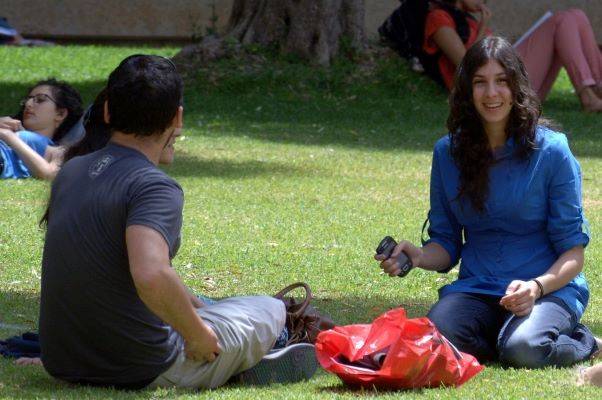The Israeli Council of Higher Education has granted Ben-Gurion University funds to facilitate student entrepreneurship.
By United With Israel Staff
Following a NIS 6 million ($1.6 million) grant from the Israeli Council of Higher Education for the establishment of a new entrepreneurship center at Ben-Gurion University (BGU) in the Negev, nine startups created by Israeli students signed investment agreements to move forward with their business plans.
The grant was given last year to establish the Yazamut 360 Entrepreneurship Center, which works in collaboration with the university-affiliated BGN Technologies company.
The center includes a student-run venture capital investment fund called Cactus Capital and Forum 80-20, a volunteer organization led by student entrepreneurs. The program, which opened in October 2018, helps students and recent graduates realize their startup dreams.
Thus far, 60 startups have been proposed. Approved startups receive $20,000, as well as business and marketing mentoring, according to YNET.
The name, Cactus Capital comes from the idea that cacti are strong plants that “stand courageously against the forces of nature with little resources – just like the students,” explained Roy Kimchi, one of the project managers. Kimchi, 29, has a bachelor’s degree in Industrial Engineering and Management and is starting a master’s degree in data science.
Danielle Hardonag, 25, currently a third year undergraduate student studying economics and business management also manages the program. Kimchi manages the fund, while Hardonag serves as operations manager.
An additional 25 students have been trained to analyze proposals and act as scouts who can find a great startup idea. Together, the group decides which students will receive support from the program.
“As a student entrepreneur at the university, you have an advantage, because not only do you have contact with the best researchers in Israel, [you have] the most important thing for an entrepreneur: talented partners in the building next door. And we are just starting out,” Kimchi said, according to YNET.
Some of the winning startups include Deltika, which identifies the amount of risk it will take for small businesses to repay loans, Sighbit, which uses image recognition technology combined with machine learning to analyze pictures and provide lifeguards with an up-to-date analysis of risk factors that could affect drownings on beaches, and Where’s Defi?, an app that provides the exact location of life-saving defibrillators in public places.
Hardonag pointed out that some of the largest billion dollar startups, like Facebook and Google, began on a campus lawn.
“Students are at the perfect stage in their lives to develop a startup – we are young, usually without a lot of commitments, and we are not afraid to dream big,” she told YNET. “If it works throughout the world, there is no reason why it shouldn’t work here at BGU.”
Hardonag explained that the fund’s first year is a pilot run.
“It’s exciting because everything is happening for the first time,” she added. “Along with the responsibility, I feel that Roy and I have a lot of freedom to influence and lead significant processes and encourage talented and creative students as they launch their first startup.”
Dana Gavish, manager of the Yazamut 360, explained that the unusual decision to let students run a million dollar program was critical to its success. “It was important for us to create a new atmosphere on campus, that says, ‘Students who have ideas for new initiatives can realize them during their studies,'” Gavish told YNET.
Gavish pointed out that course assignments become part of a larger mission, to create new initiatives that contribute to the development of the Negev, the dream of Israeli pioneer David Ben-Gurion.
“This grant is a gratifying vote of confidence in BGU’s future and our ability to guide energetic, intelligent students, faculty members and residents of the Negev region as they turn their ideas into solid businesses,” BGU President Prof. Daniel Chamovitz said of the program, according to Nocamels.
